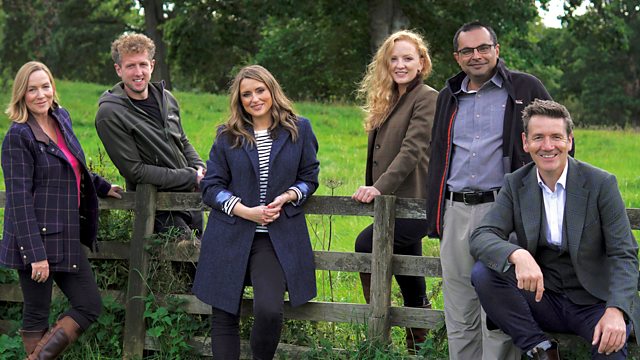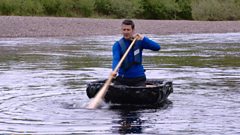
Scotland's countryside magazine.
Dougie and the team are on the River Spey. Euan looks at the issue of water abstraction, Sarah tells the story of the Muckle Spate of 1829 and Dougie takes a trip on a Currach - an ancient working river boat similar to a Coracle.
Last on
Clip
-
![]()
The Spey Currach
Duration: 00:58
Spey Special

This week Dougie and the team are exploring the River Spey.
Water Abstraction

Euan examines growing concern over the levels of water in the River. Abstraction by existing industries and Hydro power schemes combined with new housing developments and plans for additional industrial abstraction are resulting in around 50% of the water being removed in certain stretches of the river.
Muckle Spate

Sarah meets Prof Alan Werritty from Dundee University to tell the story of the Muckle Spate. In August 1829 a mighty storm lashed the north east, For two whole days the storm raged. Flash floods crashed down from the sources of all the great Grampian rivers, taking bridges, houses, crops and livestock with it. Eight people lost their lives and an estimated 289 families were made homeless. New channels were carved out by the water and the landscape was forever changed.
Canoeing

Dougie takes a trip down the Spey on a canoe with David Craig from the Scottish Canoe Association. The River Spey is one of the classic descents for canoeists. The sheer beauty of the scenery makes it a pleasure to meander leisurely downstream, but for the more experienced paddler there is also some serious white water. David guides Dougie through the scenery and points out some of the wildlife that can be viewed from a canoe.
Pearl Mussels

A recent survey by Scottish Natural Heritage of Pearl mussels in the River Spey shows that there is a 50% decline in the last decade. The previous survey carried out in 2003 showed the Spey was home to the largest population of mussels in Britain with 8-10 million mussels present. Euan meets Ecologist, Peter Cosgrove聽 to find out why the Pearl Mussel is in such decline in the Spey.
Currach

Currachs聽 - a type of Coracle - were traditionally used on the Spey by men guiding log rafts to the mouth of the river. The Currachs were originally made by stretching animal skins over a wooden frame. Modern day Currach builder, Jane Wilkinson, makes them by stretching canvas over a wooden frame and painting it with Bitumen. After explaining the history of the Currach, Jane gives Dougie a lesson in steering the craft on the Spey.
Credits
| Role | Contributor |
|---|---|
| Presenter | Dougie Vipond |
| Presenter | Euan McIlwraith |
| Presenter | Sarah Mack |
| Series Producer | Simon Cousins |

